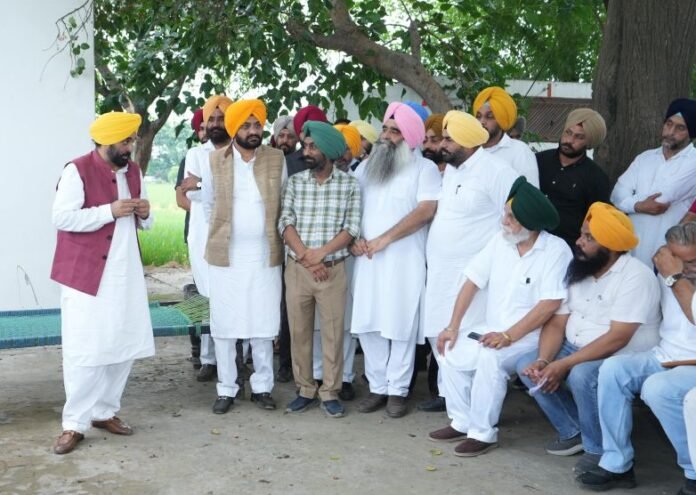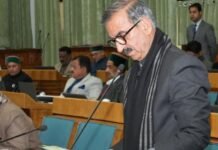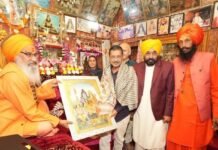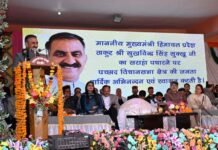In a scene that reflected both humility and transformative governance, Punjab Chief Minister Bhagwant Singh Mann departed from the usual trappings of officialdom to engage with villagers in an informal setting under the shade of trees, forging a direct connection with the people he serves. This grassroots-level dialogue marked a powerful shift in the political culture of Punjab, where the Chief Minister sought the opinions of citizens on how to sculpt a progressive and vibrant “Rangla Punjab” while also detailing the strides his government has taken in key sectors.
Interacting candidly and without protocol, Mann struck an emotional chord with residents, creating a space of genuine camaraderie where both political and social matters were discussed openly. In his address, Mann underlined how his administration had raised canal irrigation coverage from a mere 21 percent at the time of his taking office to an impressive 63 percent. He emphasized that, for the first time, water from rivers and canals was reaching even the remotest tail-end villages of Punjab, marking a turnaround in equitable water distribution. The Chief Minister made it clear that his government had resolutely protected Punjab’s water resources from external diversions, asserting the state’s right to its own rivers.
To alleviate post-harvest challenges for paddy farmers, Mann explained that his government had advanced the sowing schedule to begin from June 1, introducing a zone-wise approach to cultivation. This, he said, was implemented with careful planning and logistical support, allowing a staggered sowing timeline that benefits both farmers and the procurement process. Correspondingly, Mann said he had requested the Union government to start paddy procurement 15 days earlier, from September 15, ensuring smooth market access for farmers and better moisture control in grains.
Shifting focus to youth welfare, the Chief Minister expressed deep concern over unemployment, which he identified as the root cause of many social issues, including drug addiction. He asserted that employment opportunities must replace idleness and announced that over 55,000 government jobs had already been provided during his tenure. Mann also declared war against the drug mafia, accusing previous regimes of shielding narcotics networks. With renewed vigor, his government had begun dismantling drug syndicates, imprisoning key perpetrators and seizing properties of smugglers, signaling a full-scale crackdown.
In a significant healthcare initiative, Mann spoke about the Mukh Mantri Sehat Yojna, which he described as the country’s first scheme offering cashless medical treatment up to ₹10 lakh to every resident family. He emphasized the state government’s commitment to universal healthcare, noting that the program is designed to ease the financial burdens of illness while ensuring accessible, quality treatment.
Highlighting achievements in infrastructure and public services, Mann pointed out that the government had revived nearly 15,947 defunct watercourses, ensuring water reached distant rural corners. The state also began supplying free electricity to most households starting from July, a move that now benefits over 90 percent of the state’s population. For the first time, the Punjab government acquired a private thermal power plant to enhance power production, ensuring uninterrupted electricity even during the peak of the paddy season. The plant was named after Guru Amar Dass Ji, the third Sikh Guru, symbolizing a spiritual and cultural tribute.
The Chief Minister also made a strong appeal to curb the trend of extravagant weddings, which he said were pushing many farming families into deep debt. He advocated for simpler ceremonies to reduce unnecessary financial strain on rural households. Mann urged farmers to utilize custom-hiring farm equipment available through cooperative societies, which receive generous government subsidies. He said this model would help farmers lower their production costs and make agriculture more viable.
He did not spare his political opponents either, mocking their disconnect from Punjabi culture and language. Mann accused top opposition leaders of being out of touch with the ground realities and blamed them for ignoring education and governance during their tenure. According to him, these leaders had indulged in tokenism and elite politics, which alienated them from the masses.
Returning to the issue of narcotics, Mann said that the very leaders once seen as invincible were now behind bars for their involvement in the drug trade. He lamented that these individuals, who were elected to serve the people, had used their official positions to propagate drugs. But now, he said, justice is being served, and the government was receiving strong public support in its anti-drug campaign, “Yudh Nasheyan De Virudh,” aimed at completely eradicating the menace.
The Chief Minister concluded with an emotional note, saying that his vision of Rangla Punjab was not just about infrastructure or economic development but about restoring the dignity and well-being of its people. He expressed immense satisfaction that farmers were now reporting adequate water and electricity supply, and that their smiles reflected the success of his government’s efforts. With a renewed pledge to serve every citizen, Bhagwant Mann reaffirmed that Punjab was moving steadfastly on the path of holistic and inclusive progress.





